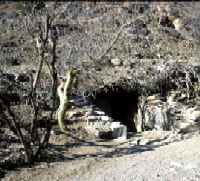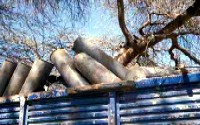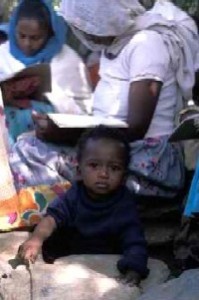First published in The Canberra Times, 7 June 1989.
In a stone room dug into the side of a narrow rocky gorge we bent towards a tiny transistor radio. It was news time and we were listening to the Voice of the Masses, the frequency of the Eritrean People’s Liberation Front, transmitting from deep within Eritrea’s “liberated zone”.
The signal was weak. My companions, all senior members of the EPLF, strained to hear a report from the front line in Tingrinya, the guttural Semitic tongue that is one of the nine national languages of this small former Italian colony on the Red Sea coast of Africa. They translated for me: “Fighting on the Massawa Asmara road continues. Four thousand Ethiopians either killed, wounded or taken prisoner. Twenty nine T54 and T55 tanks destroyed or taken. 1,489 weapons taken, three 85mm field guns, five trucks …”
“A tactical offensive to eliminate a certain portion of the Ethiopian army on the extended lowlands,” explained Andrbrehan Welde Giorgis, the Harvard educated Director of Education and member of the EPLF Central Committee, the de facto government of most of Eritrea. “Our tanks against their tanks. Conventional positional warfare designed to get us to a point where we can administer the final coup de grace…”
Outside a nomad was herding his goats to their night shelter where he would light a fire to protect them from hyenas – as his forebears had done for centuries. Inside a young revolutionary was preparing traditional Eritrean coffee on a small charcoal stove made out of recycled sheet metal. As we talked, she roasted the green coffee beans over the coals, ground them and slipped them into a bulbous clay jabena. The rich coffee smell filled our underground room illuminated by kerosene lamps.
“We are a people at war for the 28th year now,” Andrbrehan Welde Giorgis continued. “And this makes ours one of the longest wars of national liberation in the world. What we are fighting for is the right of self determination.
“But side by side with this war, we are also fighting another war; the war against illiteracy, against ignorance, against disease, against backwardness. In brief an all round struggle to transform Eritrean society.”
This was the “war” I had come to Eritrea to see – and I had found what may well be the world’s least publicised yet most effective social revolution. In this “war”, the front line is in every Eritrean community and on every degraded mountain slope, valley or field.
Tragically, Eritrea’s social transformation and the war of national liberation are intimately linked. The progress of the former depends on the success of the latter and all attempts by the EPLF to resolve the military conflict peacefully have failed so far. A military resolution, Andrbrehan’s final “coup de grace,” may yet be some time off because, although the EPLF clearly has superiority on the ground, its civilian populations and its combatants continue to be at the mercy of aerial bombardment from Ethiopian MiG fighters supplied by the Soviet Union, and from raids by helicopter gunships – hence our underground accomodation.
The recent attempted coup in Addis Ababa, the capital of Ethiopia, by rebel Ethiopian soldiers tired of fighting a war they can never win, gave brief hope for an eventual political resolution to the conflict in Eritrea. From an Eritrean point of view, peace can only be achieved with the fall of the Stalinist regime of President Mengistu Haile Mariam, so the EPLF wholeheartedly supported those plotting his demise. Meanwhile, resources that could be used for peaceful purposes in one of the poorest parts of the world are being expended on what the EPLF revolutionaries claim, is a war of national liberation against a colonising power. The Ethiopians, on the other hand, see Eritreans like Andrbrehan Welde Giorgis, as “secessionist bandits.”
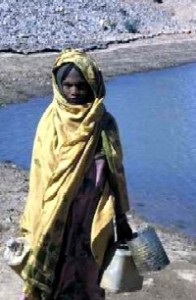
Eritrea's social revolution: a woman collects water from a dam built with international aid through the Eritrean Relief Association. Photo by Merrill Findlay, 1988.
But the social transformation, this parallel “war” against illiteracy, ignorance and backwardness, continues in Eritrea – in spite of the military conflict. It is being orchestrated by intellectuals, many of whom, like Andrbrehan, a farmers son from the highlands near Asmara, have been educated in other parts of the world and have voluntarily returned to Eritrea to be part of the revolution rather than pursue their own careers in Europe or North America.
Other revolutionaries, like the men and women of all ages who are participating in the EPLF’s vocational training and distance education programs as teachers or students, the cadres in isolated rural communities, or the students of Zero School (an EPLF boarding school of 4,000 pupils set in another narrow valley of the liberated zone) have never left Eritrea; but they too are unpaid volunteers in this grand social experiment.
“In the process of socio-economic transformation, education plays a paramount role,” Andrbrehan continued, “because when we are talking about changing society, we are talking about changing the people who compose that society – their attitudes, their relationships, their conceptions of themselves and their society and environment. So in this sense, for us, education is the instrument of liberation. It is an instrument with which we try to eradicate illiteracy and fight ignorance, try to raise the cultural level of our people. But not education for its own sake,” he insisted. ” Through education we try to improve the living conditions of the people.”
Free, universal and compulsory education for all Eritreans is the EPLF’s long term policy but Andrbrehan admitted the education program, like all the EPLF’s long term programs, still falls short of this goal. The war, the drought and the general lack of resources that Eritrea shares with all Third World nations, makes it impossible to educate the entire population of four million.
Nevertheless, progress is significant. By the end of 1988 the Department of Education had established 165 schools throughout the liberated and semi-liberated zones of Eritrea with a total student population of 27,000. The Health Department had trained 2,500 barefoot doctors in peasant communities and established a primary health care system and civilian hospital service better than those of many already independent African states. Other EPLF Departments have recorded similar achievements.
“In Eritrea, because of the long war and the deterioration of the school system in the enemy occupied areas, we have what can be regarded as a generation gap in education”, Andrbrehan Welde Giorgis explained.
“We are trying to fill this gap – so we have this orientation towards vocational training, training our people in middle level skills,in construction, electricity, agriculture, navigation etc. We have a school of technology, a school of marine sciences, school of agriculture, and virtually every civilian department has its own in-service training program which tries to upgrade the professional skills of its members.”
Graduates of the Education Department’s teacher training programme, in particular, feel their responsibility to pass on their knowledge to others keenly. To them, teaching is a noble profession.
“Most of our people are ignorant because they live in rural areas,” Almaz Lijam, a young teacher of English at the Zero School in the Orota base area told me.
“Even those who live in urban areas, few of them have the chance to learn you know, especially under this colonisation of Ethiopia. So I am responsible as a person to enlighten my people. Especially women. That is why I like to be a teacher in the revolution.”
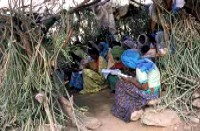
A women's literacy class in an improvised school room in Eritrea's 'liberated zone', 1988. Photo by Merrill Findlay.
I met Almaz in one of the Zero School’s staff rooms, a rough shelter made from saplings and covered in foliage to camouflage it against aerial bombardment. As we chatted under a thorny acacia tree on the narrow valley floor, thirty middle-school students filed along a well worn but stony track to their science prac. class. Yes, here in this rugged and arid gorge, was a heavily camouflaged but well equipped science lab. with rows of test tubes, chemicals, Bunsen burners – indeed everything you would expect to see in any western middle school laboratory!
In the high plateau region of Rora Hubbub, at the small peasant community of Endlal which is just twenty miles from the Eritrean trenches at the real front line and only accessible only by foot or 4WD, a younger teacher, Alefesh Asfarha, curled up on my borrowed bed in the principal’s office one night and, in a gentle whisper, told me how, at just fifteen, she had run away from occupied Asmara to fight for the independence of her country.
Now, at 21, after completing her secondary education at Zero School plus ten weeks teacher training, she is liberating her country not with a gun, but a blackboard. Her students, both children and adults, sit on rocks in their brand new class rooms and learn about a world they never knew existed until this young teacher and her colleagues arrived to establish their school.
This school and others like it in the Rora region of Sahel province is part of an integrated development program defined and implemented after the savage drought of 1984/85, by various departments of the EPLF, and financed by non-governmental aid agencies in Australia, Europe and North America through the Eritrean Relief Association. As well as schools, roads have been constructed where there were none before; primary health care clinics have been established; cash crops have been introduced; and cottage industries have been started in an effort to relieve the poverty and vulnerability to drought of the local people. Specialists from each EPLF department service the Rora communities and train the local people in improved agriculture, soil conservation, reforestation, veterinary science, health care etc.
But most basic to all these changes has been the construction of dams and wells to provide adequate permanent water so the agro-pastoralists can settle permanently if they choose. As Rigbe Bahre, a once illiterate young mother from Rora Bakla told me: “Before, we were compelled to live a nomadic lifestyle because there was no other choice. We were always exposed to extremes of climate and other things; this stationary life we can now lead is different and much better.
“And we are learning things now. To know something which you don’t know before is always good especially when it improves your life and helps you understand your environment. Now we have started to know even how other people live and who is bordering our country and so on.”
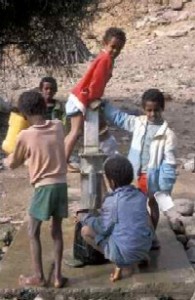
Children at a tube well during a break from school in one of Eritrea's displaced persons' camps. Photo by Merrill Findlay, 1988.
She paused while my Eritrean friend translated. “Yes, it is nice to know something. And our children are especially lucky to get education while they are still young. Their lives will be very different from ours.”
Back in the underground room in the narrow gorge that is the EPLF Secretariat, the coffee boiled and bubbled up the slim neck of the jabena. Three times the girl caught the overflow as ritual prescribes, then poured the dark fluid into tiny white cups already half filled with sugar. It was thick and very sweet, with just a hint of spice. And across the mountains the tactical offensive continued, fueled by the Soviet Union and its allies. (Ironically, the Soviet Union arms both sides in the conflict, since the Eritreans fight only with captured weapons.)
“Even though Mengistu must be an embarrassment now to the Soviet Union, you’re still at the mercy of the superpowers …” I suggested in the half light.
“Not really,” Andrbrehan Welde Giorgis insisted. “The involvement of the superpowers operates only to increase the sacrifice of the people and the duration of the struggle. It cannot stop us from winning our right to self determination.”
He shrugged and gestured with his hand, the tiny white coffee cup, half empty now, still held delicately between his fingers. “Look, after the first fourteen years of the struggle – and we started in 1961 from scratch with no weapons at all – we were able to defeat Haile Selassie’s army that was supported by the United States and Israel.
“In 1977, the Soviet Union started massive military intervention – not learning from the experience of the United States in Eritrea. Of course by 1978 we were clearly on the defensive. But we were able to frustrate one [Ethiopian] offensive after another. And now we are again on the strategic offensive ourselves.
“It took us fourteen years to beat Haile Selassie’s army. We don’t know how many years it will take us to defeat [President Mengistu] supported by the Soviet Union, but defeat is inevitable for the Ethiopians. We are already winning. It is just a question of time.”
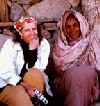 STOP PRESS: Eritrea finally won its independence in 1992. One day I hope to return to write about the changes that have taken place since my visit in 1988/89. mf
STOP PRESS: Eritrea finally won its independence in 1992. One day I hope to return to write about the changes that have taken place since my visit in 1988/89. mf
Disclosure: I visited Eritrea as what we would now call an embedded journalist with the Eritrean People’s Liberation Front, which means that I only saw one side of this war. There were, however, many sides to this struggle.
Content migrated to this site on 5 December 2010. Last revised 4 February 2011.

